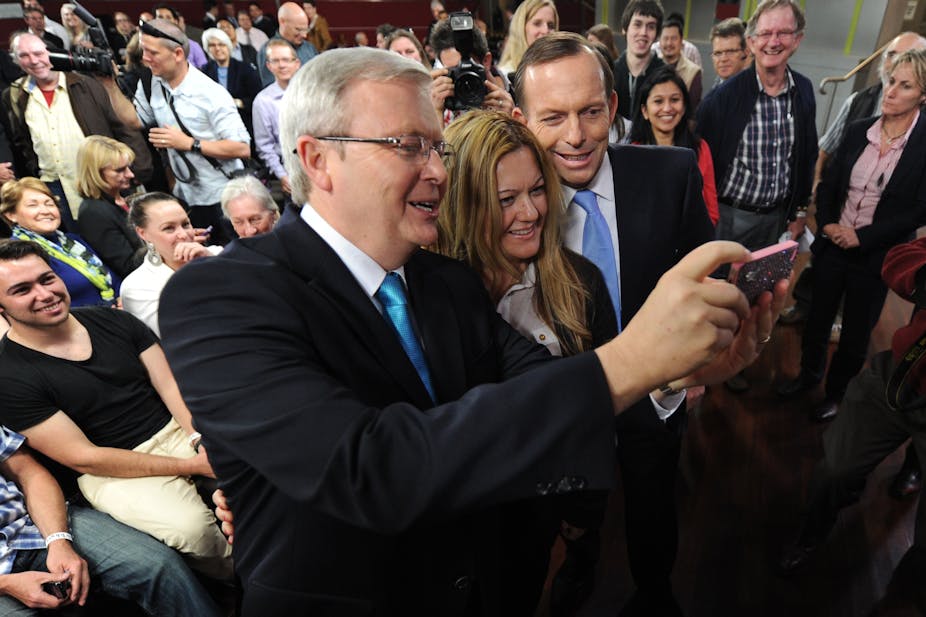Who “won” or “lost” tonight’s debate – and opinion was divided – was less important that what new was said by Kevin Rudd.
Most notably, Rudd seemed to significantly toughen the government line on foreign investment in Australian land.
He also appeared to open discussion for a more liberal approach on access by people before their retirement to their superannuation.
Foreign investment is a sensitive area - for the economy, relations with other countries and domestic politics.
There have been tensions within the Coalition, where opinion ranges from very “dry” open go Liberals to some Nationals who’d like a much more restrictive policy.
Tonight Rudd was sounding rather like Barnaby Joyce when asked about protecting Australian land from foreign buy ups.
“I’m a bit old-fashioned on these questions and I’m not quite as free market as Tony … maybe it’s because I grew up on a farm,” he said.
He went on to suggest that if undeveloped agricultural land needed a lot more investment, the best way would be a joint venture approach, comprising equity from farmers, perhaps through co-operatives, with domestic or some external investment.
“I am a bit nervous, a bit anxious, frankly about simply an open slather on this.
"What would our policy approach be? I am looking very carefully at how this affects the overall balance of ownership in Australia. I’m thinking particularly of our agricultural sector, but the impact in certain cities also of these sorts of acquisitions.
"We often get criticised for trying to be protective. I actually look around the world and I see many many countries being equally protective of their own core assets.
"We need to take a more cautious approach to this in the future without throwing the baby out with the bathwater, and I think [with] rural lands and the development of places across northern Australia to boost our agricultural exports we need a better joint venture approach.”
This taps into what has been a very live political issue especially in regional areas. But it did also seem policy out of nowhere.
At another point he sounded like he was channelling his good friend Bob Katter, as he sympathised with farmers who had told him they were getting squeezed in selling their produce by Coles and Woolworths.
“I’m now worried about that big-time and, therefore, what we’ve got to look at if we are returned … is how we provide better guarantees for proper competitive conduct out there so that the man and woman on the land is not actually having to carry the can for everything.”
Asked about people getting access to some of their superannuation for buying houses to live in (if young) or investment (pre-retirement), Rudd also moved into some new territory. He ruled this out for the young but said “for older folk, we need to look at how people can gain access to funds earlier, which is their money.”
By his comments on foreign investment especially Rudd has opened new fronts of policy debate for the latter stage of this campaign. It’s unclear whether this was his intention.
His remarks will be scrutinised in China and domestically he will be pressed for more detail. Obvious questions arise – such as, did he consult colleagues about hardening the government’s position?
It does seem strange to announce this in the debate forum. It was not like his deliberate strategy in the initial debate of dropping his plan for a gay marriage bill in the first hundred days. This appeared more a case that the question happened to tap into what was in his head.
The audience of undecided voters scored the debate 45 to 38 to Rudd. This encounter lacked the liveliness of the Brisbane forum; there were a few barbs but no “does this guy ever shut up?” moment. Rudd made a point of saying he would stay to talk to people (because that worked for Abbott last time). No doubt he was very nice to the make-up woman.
Rudd seemed more animated than Abbott. He kept his cool during some critical questions, notably one about his destabilising Julia Gillard’s leadership. When challenged on his proposal to relocate ships from Garden Island he declared “I don’t apologise for being in the vision business.”
He repeatedly hammered Abbott about his paid parental leave scheme, and pushed the opposition leader on why he would not release his policy costings and budget bottom line then and there.
Both leaders pledged to keep all their promises – an undertaking that the winner will inevitably break.
Abbott batted through in a night-watchman sort of style. He didn’t radiate any sense of excitement and had a lot of same-old, same-old lines (ending carbon tax, stopping boats etc), although he did say the Coalition was not planning to shut any Medicare Locals, a guarantee he declined to give a few days ago.
But they won’t be raising eyebrows in Beijing or anywhere else about what he said and he didn’t open up any big new questions for the morning. And he’d rate that as a very satisfactory outcome.

